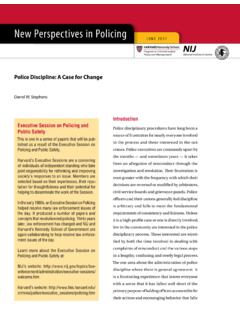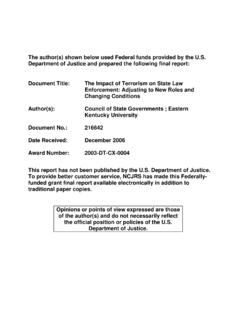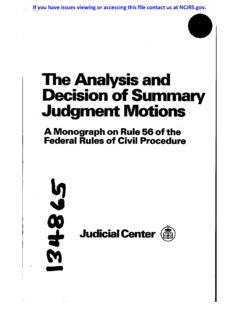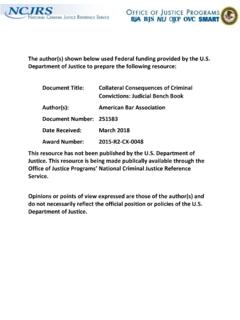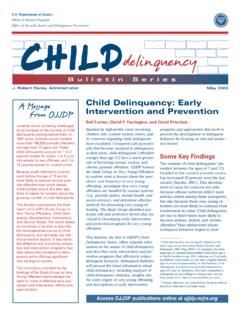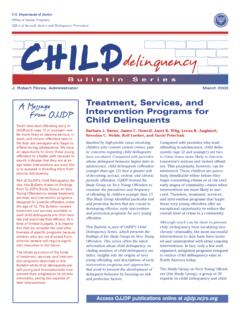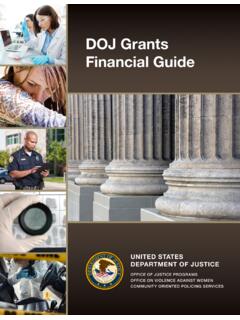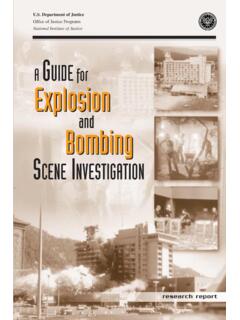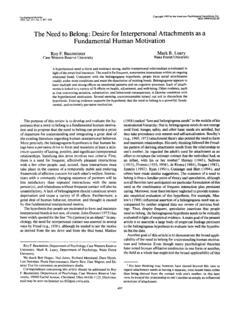Transcription of Psychology of Terrorism
1 Psychology of Terrorism 0 Randy Borum Director, Psychology of Terrorism Initiative Psychology of TerrorismPsychology of Terrorism 1 2004 By Randy Borum All rights reserved. Except as permitted under the United States Copyright Act of 1976, no part of this publication may be reproduced or distributed in any form or by any means, or stored in a database or retrieval system, without the prior written permission of the authors. Correspondence regarding this report may be directed to: Randy Borum, Department of Mental Health Law & Policy Louis de la Parte Florida Mental Health Institute University of South Florida 13301 Bruce B. Downs Boulevard Tampa, Florida 33612-3807 Email: The University of South Florida is an affirmative action Equal Opportunity Employer.
2 About the Author: Dr. Randy Borum is Associate Professor in the Department of Mental Health Law & Policy University of South Florida, where he also holds faculty appointments in the Department of Criminology and the College of Public Health. He is a licensed psychologist, and is Board-Certified (ABPP) in Forensic Psychology . He is author/ co-author of more than100 professional publications, and currently serves as a consultant to the US Department of Defense, Department of Homeland Security, US Intelligence Community, Advisory Board Member for the FBI s Behavioral Science Unit, and Instructor for the BJA s State and Local Antiterrorism Training (SLATT) Program. He was the Principal Investigator on the " Psychology of Terrorism " initiative for a US government agency.
3 He is Past-President of the American Academy of Forensic Psychology , and serves on the United Nations Roster of Experts in Terrorism . Suggested Citation: Borum, R. (2004). Psychology of Terrorism . Tampa: University of South Florida. Printed in the United States of America Psychology of Terrorism 2 TABLE OF CONTENTS Executive Summary 3 Introduction 4 Aims & methodology 6 Psychological approaches to understanding violence
4 9 Instinct Theories Drive Theories (Frustration Aggression) Social Learning Theory Cognitive Theory Biological Factors Raw Empirical Approaches First generation psychological research on Terrorism 18 Psychoanalytic Theory Narcissism Early Typologies Contemporary psychological research on Terrorism 22 How and why do people enter, stay in, and leave terrorist organizations?
5 To what extent is psychopathology relevant for understanding or preventing Terrorism ? To what extent is individual personality relevant for understanding or preventing Terrorism ? To what extent are an individual s life experiences relevant for understanding or preventing Terrorism ? What is the role of ideology in terrorist behavior? What distinguishes extremists who act violently from those who do not? What are the vulnerabilities of terrorist groups? How do terrorist organizations form, function, and fail? Conclusions on the state of research 64 References 69 Psychology of Terrorism 3 Senior Advisors: Dr.
6 Robert Fein Mr. Bryan Vossekuil Psychology of Terrorism Executive Summary Senior Consultants:Dr. Martha Crenshaw,Dr. John Horgan, Dr. Andrew Silke,Dr. Michael Gelles, & Dr. Scott Shumate Randy Borum As part of the ongoing effort to better understand the causes, motivations and determinants of terrorist behavior, based on a comprehensive review of the scientific and professional literature, this report analyzes key findings on the Psychology of Terrorism . Although early writings on the Psychology of Terrorism were based mostly in psychoanalytic theory ( , narcissism, hostility toward parents), most researchers have since moved on to other approaches. People become terrorists in different ways, in different roles, and for different reasons.
7 It may be helpful to distinguish between reasons for joining, remaining in, and leaving terrorist organizations. Perceived injustice, need for identity and need for belonging are common vulnerabilities among potential terrorists. Mental illness is not a critical factor in explaining terrorist behavior. Also, most terrorists are not psychopaths. There is no terrorist personality , nor is there any accurate profile psychologically or otherwise of the terrorist. Histories of childhood abuse and trauma and themes of perceived injustice and humiliation often are prominent in terrorist biographies, but do not really help to explain Terrorism . Terrorist ideologies tend to provide a set of beliefs that justify and mandate certain behaviors.
8 Those beliefs are regarded as absolute, and the behaviors are seen as serving a meaningful cause. Not all extremist ideologies promote violence, nor are all extremists violent. One might ask whether the ideology is driven more by promotion of the cause or destruction of those who oppose it. The powerful, naturally-occurring barriers that inhibit human killing can be eroded either through outside social/environmental influences or by changing how one perceives the situation. Terrorist groups, like all social collectives, have certain internal ( , mistrust, competition) and external ( support, inter-group conflict) vulnerabilities to their existence. Surprisingly little research or analysis has been conducted on terrorist recruitment.
9 Recruitment efforts do appear concentrated in areas where people feel most deprived and dissatisfied. Relationships are critical. Effective recruiters create and exploit a sense of urgency and imminence. Effective leaders of terrorist organizations must be able to: maintain a collective belief system; establish and maintain organizational routines; control the flow of communication; manipulate incentives (and purposive goals) for followers; deflect conflict to external targets; and keep action going. Research on the Psychology of Terrorism largely lacks substance and rigor. Cultural factors are important, but have not been studied. Future research should be operationally-informed; maintain a behavior based focus; and derive interpretations from analyses of incident-related behaviors.
10 Psychology of Terrorism 4 Section 1 Introduction In the current national security environment, there is little question that Terrorism is among the gravest of threats. Massive resources throughout the government and private sectors have been allocated and re-allocated to the task of preventing Terrorism . These efforts, however, often lack a conceptual - let alone empirically-based foundation for understanding terrorists and their acts of violence. This void creates a serious challenge at many levels, from policy-level decisions about how a state should respond to Terrorism , to individual-level decisions about whether a given person of interest, who espouses extremist ideas, truly poses a serious threat to personnel, assets, and interests.
